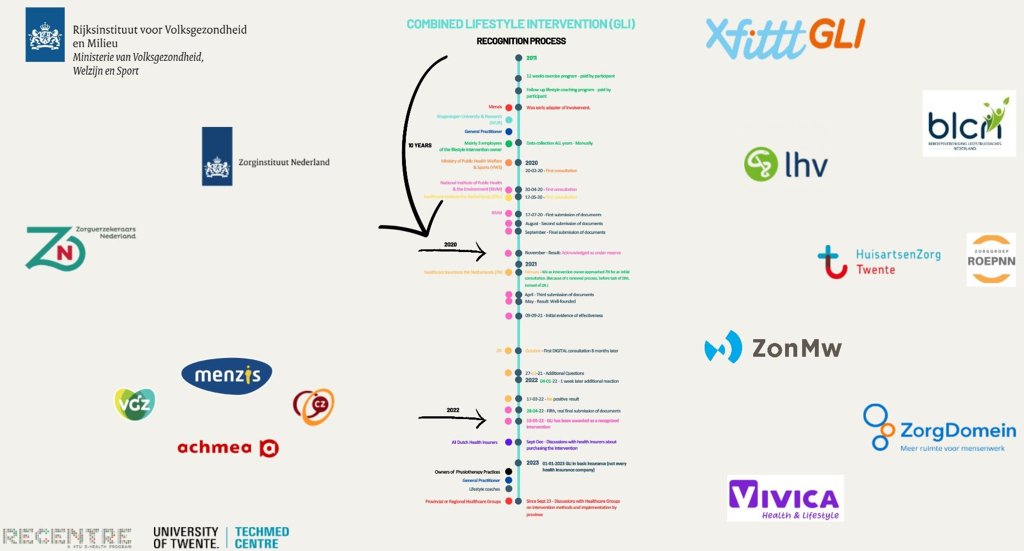𝘙𝘌𝘊𝘌𝘕𝘛𝘙𝘌 𝘵𝘢𝘬𝘦𝘴 𝘤𝘰𝘭𝘭𝘢𝘣𝘰𝘳𝘢𝘵𝘪𝘰𝘯 𝘸𝘪𝘵𝘩 𝘪𝘯𝘯𝘰𝘷𝘢𝘵𝘪𝘰𝘯 𝘢𝘯𝘥 𝘪𝘮𝘱𝘭𝘦𝘮𝘦𝘯𝘵𝘢𝘵𝘪𝘰𝘯 𝘴𝘵𝘢𝘬𝘦𝘩𝘰𝘭𝘥𝘦𝘳𝘴 𝘴𝘦𝘳𝘪𝘰𝘶𝘴𝘭𝘺!
🧠Recently, we successfully organized our first RECENTRE stakeholder lunch session. The RECENTRE team met with a clinical expert, business development expert and health systems expert to exchange knowledge and practical experiences on the topic of Market Research & Reimbursement of Lifestyle Interventions and eHealth.
️The session started with a short introduction on why and how market research is relevant in academic and early development settings (Meyke Roosink, PhD Roosink), followed by three so called “engagement cycles” on the reimbursement of lifestyle interventions and eHealth (Marloes Makkink).
️♻️During these cycles, Marloes introduced the different market access routes, the importance of understanding and demonstrating the added value of an innovation (why, how, what), shared her practical experiences with the recognition process of a combined lifestyle intervention, and discussed the potential added value of eHealth within such an intervention. After each cycle, there was a discussion round with all three experts, followed by a short Q&A with the RECENTRE team.
𝐖𝐡𝐚𝐭 𝐡𝐚𝐯𝐞 𝐰𝐞 𝐥𝐞𝐚𝐫𝐧𝐞𝐝?
🧭The recognition route to reimbursement can be long and winding and is filled with many stakeholders. This denotes the importance of having a good overview of relevant stakeholders at an early stage. Despite taking more than 10 years for the lifestyle intervention (X-Fittt GLI) to become reimbursed as part of the basic insurance for people with obesity and overweight, this was an important step in lowering the threshold of participation and improving the accessibility of care.
💡Experts recognized the dedicated time needed for demonstrating added value through research, which might be facilitated by involving end-users early and by ensuring that the innovation fits with existing practices and replaces instead of expands current care practices. In some cases, reimbursement might not be realistic or feasible. For example, in the Netherlands, digital care is currently reimbursed as part of regular care. As such, if a digital health innovation has a solid business case for care providers (or employers), this might be a more feasible access route.
️️️⚖️Lastly, concerns were raised about evidence requirements for personalized (digital) lifestyle interventions, and about unclear responsibilities (and financing) around lifestyle aspects such as general wellbeing and loneliness. These will be important considerations moving forward.
We would like to thank all participants for attending this session!
Arianne van Bon | René A.J. Loek | Robin M. Toorneman
Vivica Health & Lifestyle | Zorginstituut Nederland




